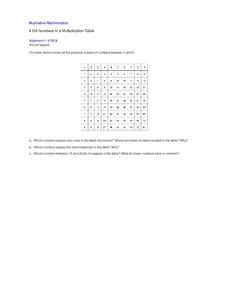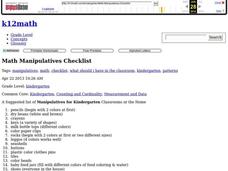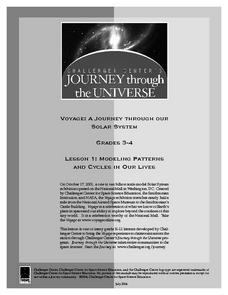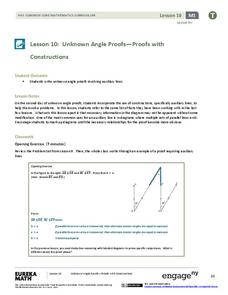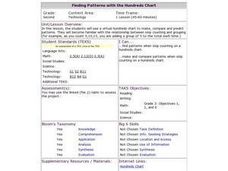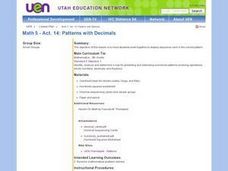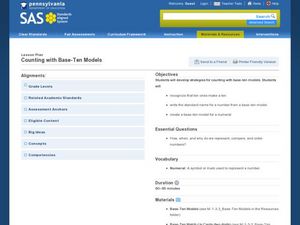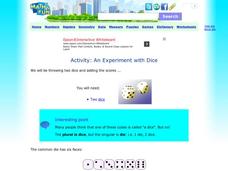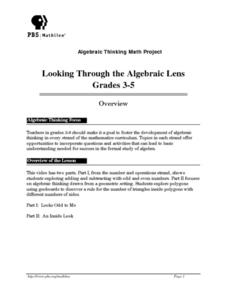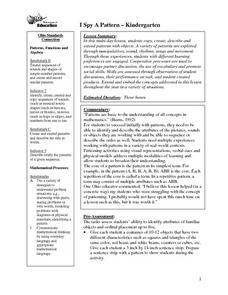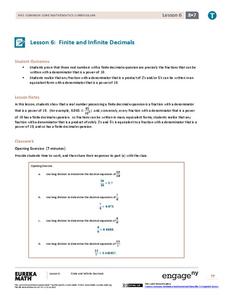Illustrative Mathematics
Numbers in a Multiplication Table
Identifying patterns is a crucial skill for all mathematicians, young and old. Explore the multiplication table with your class, using patterns and symmetry to teach about square numbers, prime numbers, and the commutative and identity...
Curated OER
Alice in Fractalland
Take your class on a field trip to Fractalland where they'll learn all about number and shape patterns. Based on Disney's movie Alice in Wonderland, this resource takes young mathematicians on an adventure as they explore patterns in...
Curated OER
Number Patterns
An easy way to introduce numerical patterns, these activities can be made simpler by using addition, or more difficult with division, fractions, and percentages. Children examine patterns and determine the missing number in the sequence....
Curated OER
Patterns
Explore early algebra by participating in a pattern identification activity using a random assortment of different household materials. The class creates, completes, and analyzes different patterns with the help of leggos, buttons,...
PBS
Patterns to the Rescue!
Track down the Cyberchase episode that this instructional activity is associated with. Using a worksheet that is embedded in the plan, learners must find the next two numbers and shapes (a double pattern). Once these have been...
Curated OER
Modeling Patterns and Cycles in Our Lives
Students explore how building a model can help them better understand the natural world. They identify common cycles or patterns in nature as well as examples of models in the classroom. After discussion, they choose a pattern or cycle...
5280 Math
Decimal Patterns
Find patterns in the process instead of the result. Learners convert series of decimals and fractions identifying patterns along the way. The lesson includes nine problem tasks with progressively more involved patterns.
Curated OER
Number Patterns in Everyday Life
Examine scenarios involving number patterns. Learners complete a series of activities, including working with Pascal's triangle ando completing chart activities based on different pricing for pizza toppings. An included extension has...
Mathematics Assessment Project
Generalizing Patterns: The Difference of Two Squares
After completing an assessment task where they express numbers as the difference of squares (i.e., 9 = 5^2 – 4^2), class members note any patterns that they see in the problems.
Mathematics Assessment Project
Generalizing Patterns: Table Tiles
As part of a study of geometric patterns, scholars complete an assessment task determining the number of tiles needed to cover a tabletop. They then evaluate provided sample responses to see different ways to solve the same...
EngageNY
Unknown Angle Proofs—Proofs with Constructions
Provide your emerging mathematicians with the tools to learn as they incorporate auxiliary lines to solve unknown angle proofs in this continuing segment. They decipher information from a diagram to uncover the missing pieces and...
Curated OER
Finding Patterns with the Hundreds Chart
Students review their numbers up to one hundred. Using a chart, they compare and predict patterns that might be in the numbers. They practice skip counting and grouping numbers. Using a spreadsheet, they graph different sets of numbers...
Curated OER
Patterns with Decimals
Fifth graders are given a set of manipulatives to use to develop patterns. In groups, they follow the directions to determine which blocks go with which pattern and put them into the correct sequence. To end the lesson plan, they...
Curated OER
Patterns in the Multiplication Table
Explore patterns in the multiplication table in order to deepen your third graders' understanding of this essential skill. Implement this activity as a whole-class lesson, allowing students to work in pairs or small groups to support...
EngageNY
Integer Sequences—Should You Believe in Patterns?
Help your class discover possible patterns in a sequence of numbers and then write an equation with a lesson plan that covers sequence notation and function notation. Graphs are used to represent the number patterns.
EngageNY
Numbers in Exponential Form Raised to a Power
Develop an understanding of the properties of exponents through this series of activities. This third lesson of 15 explores the patterns associated with the power property. Scholars expand the powers before applying the property.
EngageNY
Numbers Raised to the Zeroth Power
What in the world is the zeroth power? Examine the patterns of exponents as they apply to the zeroth power. Scholars apply the zero property to simple exponential expressions in this fourth lesson in a series of 15. The examples include...
Curated OER
Counting with Base - Ten Models
Help your kids develop strategies for counting. In this base-ten lesson, learners use matching cards, base 10 blocks, and dry erase markers and boards to examine the base 10 counting system.
Curated OER
Activity: An Experiment with Dice
Roll the dice with this activity and teach young mathematicians about probability. Record outcomes for rolling two number cubes in order to determine what is most likely to happen. Graph the data and investigate patterns in the results,...
Curated OER
Looking Through the Algebraic Lens
Students work with rectangles to find generalizations for adding and subtracting odd and even numbers in part one of the lesson. In part two, students use geoboards to construct polygons, look for patterns, and find a general rule.
Curated OER
I Spy a Pattern-Kindergarten
Students copy, create, describe, and extend patterns with objects. They explore a variety of patterns through the use of manipulatives, sound, rhythms, songs and movement. Cooperative processes are used to encourage partner discussion.
EngageNY
Finite and Infinite Decimals
Explore the patterns of fractions that produce finite and infinite decimals. The sixth lesson of the series asks learners to determine a similar feature of fractions that produce finite decimals. Using the patterns, pupils create...
Curated OER
Grade 3: Palindrome Patterns
Third graders use addition to create numbers that are palindromes and organize their results to look for patterns. They make generalizations from patterns and practice reading large numbers and addition with regrouping.
Alabama Learning Exchange
Pattern and Practice
Young scholars learn how to make patterns. Students first display their prior knowledge of patterns before delving into the lesson. They complete a worksheet and participate in a web-based class activity. They work in cooperative groups...
